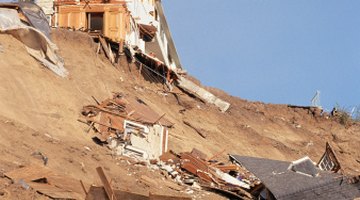Wherever you live, whether it’s near an earthquake fault, in the tornado alley or along a river that floods, some form of natural disaster is always a possibility. Even in the safest places, lightning can strike. Taking precautions and insuring your valuables makes good sense. If a natural disaster does strike, it's not surprising the local economy is affected negatively in some ways. What is not so apparent is that natural disasters can have a positive effect on the local economy as well.
Con: Insurance Risk Increases
Natural catastrophes put economic pressure on insurance companies as well as on the insured. The National Bureau of Economic Research studied the catastrophic effects of natural disasters on insurance markets and found that during 1984 to 2004, unexpected catastrophes put economic pressure on insurers and policy holders. Insurers respond to the increased risks after natural disasters by raising insurance rates, making insurance more expensive for policyholders. Additionally, unexpected catastrophes reduce total premiums earned in the state, reduce the numbers of insurers in the state and cause firms to leave.
Con: Worklives are Disrupted
Any natural disaster, if severe enough, will affect people’s day-to-day lives, and that includes their livelihood. If a mudslide destroys the family car, getting to work becomes a lot more difficult. If a nor’easter floods streets in your coastal town it might also flood the office where you work or the store that you own. The lost income of a shuttered business during the disruption after a natural disaster affects the company’s bottom line.
Pro: Post-Disaster Cleanup and Restoration
Certain businesses are part of the economic sector that helps people get their lives back to normal after a natural disaster. Construction contractors, tree trimmers, cleaning companies, snow removal contractors, even car dealerships can benefit economically from people’s need to clear out debris, rebuild their home or buy a new car after a tornado, earthquake or ice storm. According to a 2008 "New York Times" article, studies of earthquakes in California and Alaska concluded the earthquakes stimulated economic activity. There is also evidence that hurricane-prone countries tend to experience higher growth rates. Studies have even found a positive relationship between disasters and subsequent innovation.
Con: Infrastructure Damage
Natural disasters can impede commerce and transportation when they destroy infrastructure. Flooding in Queensland, Australia, in early 2011 destroyed a rail line that served an energy company and transported coal, passengers and grain. Landslides also destroyed part of a bridge. In addition to physical structures, computer networking infrastructure can go down, disrupting Internet access for the affected area. According to a study out of the Georgia Institute of Technology, network-service disruption is inevitable after large-scale natural disasters. After Hurricane Katrina, for example, close to 26 percent of computer subnets (portions of computer networks) were unreachable, the study concluded. The majority of these unreachable subnets lasted at least four weeks.
Related Articles
References
- National Bureau of Economic Research: The Catastrophic Effects of Natural Disasters on Insurance Markets
- New York Times: "Do Natural Disasters Stimulate Economic Growth?"
- Bloomberg: "Queensland Floods Destroy Bridge, Halt Trains for Passengers, Coal, Grain"
- GaTech: Inference of Network-Service Disruption upon Natural Disasters
- Dictionary: "Subnet"
Writer Bio
Siobhan Egan has edited newspapers and news websites at the Jersey Shore since 1999 and been an attorney since 1994. Her writing has won five statewide awards from the New Jersey Press Association. She has a Bachelor of Arts in Spanish from Bucknell University and a Juris Doctor from Temple University.











